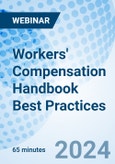Ensure you have the right policies and procedures in your workers’ compensation handbook to control workers’ compensation claim costs.
Having an employee handbook is in every company’s best interest. It serves as a tool to communicate policies, procedures, and company values. Employee handbooks provide protection for employers when they are consistently followed. Crafting a comprehensive employee handbook involves covering essential policies workers’ compensation, discrimination and harassment, accommodations, wage and hour policies, standards of conduct, drug and alcohol policies, and complaint and reporting procedures. Employee handbooks are not one-size-fits-all and should be tailored to your industry, company size, and unique practices.
Many employers have locations in multiple states. Each state has its own approach for employers when dealing with workers’ compensation claims filed by their employees. Some states have very unique handling of multiple aspects of workers’ compensation claims. This presentation will help the persons responsible for providing workers’ compensation benefits follow documented and detailed procedures contained in the Handbook. While every claim should be viewed on a case-by-case basis, this presentation will explore the methodical process applied throughout various states’ Workers’ Compensation Statutes. This presentation will assist risk management and claims professionals with understanding how to analyze, evaluate, and ultimately attempt to resolve claims in a manner that reduces exposure for employers in the most efficient and cost-effective way possible.
Learning Objectives
- You will be able to define what is considered an employee handbook which meets best practices as a centralized source of information, ensuring that all employees understand company policies, procedures, and expectations.
- You will be able to describe the standard steps to outline the process for reporting employee work injuries and your company’s compensation package.
- You will be able to discuss what is clearly expected of employees in terms of behavior, performance, and responsibilities.
- You will be able to explain how an employee handbook defines the boundaries between acceptable and unacceptable behavior, reduces misconduct, and creates a positive work environment.
Agenda
Speakers

Zachary M. Rubinich,
Rawle & Henderson LLP- Partner in the Philadelphia office of Rawle & Henderson LLP
- Focuses on the defense of insurance carriers, self-insured entities and third-party administrators against workers’ compensation claims in Pennsylvania
- Based on his extensive experience, the Pennsylvania Bar Association Workers’ Compensation Law Section has certified him as specialist in the practice of workers’ compensation law
- Handles all aspects of litigation before workers’ compensation judges, the Workers’ Compensation Appeal Board, the Commonwealth Court and the Pennsylvania Supreme Court
- Routinely counsels employers, insurance carriers and third-party administrators on claims management, workplace safety, return-to-work programs, employment practices and risk management
- Chair of the American Bar Association’s Tort Trial and Insurance Practice (TIPS) Workers’ Compensation and Employers’ Liability Law Committee for 2018-2019, served as Vice-chair of the Committee for 2015-2016, 2016-2017 and 2017-2018
- Recently appointed to the following ABA leadership positions, effective September 2019: Vice-chair of the Litigation and Trial Practice Committee; Vice-chair of the Appellate Advocacy Committee; member of the Ethics and Professionalism Standing Committee; and member of the CLE Board Committee
- Achieved the highest rating in the Martindale-Hubbell Law Directory in 2019 for seventh consecutive year, selected as a 2019 Pennsylvania Super Lawyer by Super Lawyers, selected by Super Lawyers as a Pennsylvania Rising Star from 2010-2014
- J.D. degree, Widener University School of Law; B.A. degree in political science and government, Lycoming College

Daniel G. Spafford,
Rawle & Henderson LLP- Of Counsel to Rawle & Henderson and a member of the firm’s workers’ compensation practice group
- Practices focuses on workers’ compensation cases
- Handled cases for both employers and employees in civil and workers’ compensation matters
- Member of the bar in his home state of New Jersey but also New York and Pennsylvania
- J.D. degree, Rutgers School of Law; B.S. degree, California State University
Who Should Attend
This live webinar is designed for human resource managers, workers’ compensation administrators, benefits and payroll professionals, business owners and managers, CFOs, controllers, claims and risk managers, safety managers, accountants, and attorneys.










